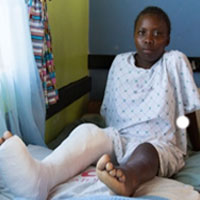
Top Pediatric Orthopedic Surgery In India
Top Pediatric Orthopedic Surgery In India
What is a Pediatric Orthopedic Surgery?
Pediatric orthopedic surgery in India is a medical specialty involving the musculoskeletal (bone, joint or muscle) problems in children, infants and adolescents. Young children who are still growing their bodies respond differently to disorders and injuries. The pediatric orthopedic surgeons in India are extensively trained to accommodate this fact. Our faculty and staff at the top hospitals for pediatric orthopedic surgery in India understand the unique needs of children with the orthopedic disorders and provide expertise in diagnosing and treating a wide range of conditions. The hospitals are world renowned for patient care in children’s orthopedic surgery.
What is the Pediatric Orthopedic Surgery Cost in India?
The prospect of having a child needing surgery can cause considerable anxiety. The pediatric orthopaedic surgeons in India have years of experience to perform each procedure they offer to the patients. Along with knowing what to expect on the day of surgery can make the experience much easier and ensures that everything runs smoothly.The Cost of Pediatric Orthopedic Surgery in India can range from approximately Rs. 1,60,000 ($2,000) to Rs. 3,20,000 ($4,000). The cost may vary depending on factors such as the type of surgery, the hospital and surgeon’s fees, and any additional medical expenses. Send us your query to get affordable cost of pediatric orthopedic surgery in India.
Why Visit Pediatric Orthopedic Surgeons in India?
Pediatric orthopedic surgeons in India are the best trained and most experienced doctors to properly evaluate and treat the musculoskeletal (bone, joint or muscle) problems in a child who is still growing. A pediatric orthopedist treats the newborn babies through the teenagers. They focus their medical practice to take of children and learn the unique nature of the medical and surgical care of children from advanced training and experience.
The education and training of pediatric orthopedic surgeons include four years graduation from an approved medical school, five years graduation from an approved orthopedic surgery residency program and one year additional subspecialty training in pediatric orthopaedics and pediatric spinal deformity.
Children are not just small adults- they cannot always be patient and cooperative during the medical examination, answer the medical questions or speak what is bothering them. The pediatric orthopaedic surgeons know how to examine and treat children in a way that they are relaxed and cooperate. Also they appreciate the worry of having a child with a musculoskeletal problem and have experience communicating with the anxious family members. Most of the pediatric orthopedic surgeon’s office are arranged and decorated with specially designed equipments, toys, videos and reading materials by keeping the children in mind. This helps to create a comfortable and non-threatening environment for the child.

Mrs.Mary Wanjiku, Kenya
Knock Knees Surgery for her Daughter
My daughter is a badminton player and was diagnosed with knock-knees, an opposite type of knee alignment. However this formation of the knee was a pattern of her growth that allowed her to perform all activities normally, even play badminton. Later after she was 15, this structure of knees became painful and started creating troubles for her. I consulted various doctors and they all suggested me wedge osteotomy surgery to rectify the problem and correct the knee alignment. In this surgery, an incision is made at the bottom of the thighbone or the top of the shin bone. Through this incision, a small portion is removed and then the knee alignment or known knee is corrected.
Now, the question was getting the right doctor for the surgery. I connected with various doctors in Ireland and then browsing the website came across some impressive reviews for JointReplacementSurgeryHospitalIndia, a medical tourism company in India. The reviews and testimonials were quiet engaging and hence I thought of getting connected to them. From that first communication to post surgery care for my daughter, the team did an excellent job. They helped me throughout the surgery and stood beside me at all stages that the surgery would go fine and that what happened. The surgery was successfully accomplished and there were incredible improvements in her walking, running, and playing badminton.
Common Conditions Treated by a Pediatric Orthopedic Surgeon
A child’s musculoskeletal problems are different from those of an adult as their body is still growing. The body’s response to infections, injuries, and deformities are quite different than what would be in a full grown person. Sometimes what is thought of as a problem in a child is just a variation of growth which will resolve within time. Some problems children have with their bones and joints are due to growth and they do not even occur in adults. Additionally, the evaluation and treatment of a child is quite different than in an adult even for the same problem. A medical-surgical team approach is taken to manage the children with complex pediatric orthopedic problems.
Pediatric orthopedic surgeons diagnose, treat and manage the following musculoskeletal problems in children:
-
- Knee Conditions
- Blount’s disease
- Meniscus tears
- Anterior Cruciate Ligament (ACL) injuries
- Osteochondritis Dissecans (OCD)
- Knee Disorders
- Ligament Injuries (MLC, LCL, PLC)
- Plica Syndrome
- Patellar (Kneecap) Dislocations
- Leg Length Discrepancies
- Hip Conditions
- Hip dysplasia dislocation
- Femotal anteversion
- Legg-Calve-Perthes disease
- Hip impingement, labral tears
- Slipped Capital Femoral Epiphysis (SCFE)
- Spine Conditions
- Scoliosis
- Kyphosis
- Spina bifida
- Spondylolysis, spondylolisthesis, stress fracture
- Pediatric spinal deformity and spine disorders
- Foot and Ankle Conditions
- Metatarsus adductus
- Clubfoot
- Vertical talus
- Toe walking
- Flatfoot
- Osteochondritis Dissecans (OCD or OD)
- Tarsal Coalitions
- Cavus Foot
- Elbow
- Osteochondritis Dissecans
- Ligament Injuries
- Growth Plate Injuries
- Little Leaguer’s Elbow
- Shoulder
- Labral Tears
- Shoulder Instability or Dislocation
- Little Leaguer’s Shoulder
- Knee Conditions
Planning Affordable Pediatric Orthopedic Surgery in India is an easy process.
Our Hospitals Network and Surgery Group is available in 15 cities of India for our patients to access. Kindly fill up the form for a free opinion from our expert team. You will be provided with an analysis and recommendations for your surgery. NO CHARGES LEVIED.
Special ALL SERVICES INCLUSIVE Packages available for INTERNATIONAL PATIENTS
What to Expect at the Preoperative Visit for Pediatric Orthopedic Surgery?
You will be asked to visit the hospital once your surgery is schedule. Usually this visit will be a week before the operation and a general exam is performed on the patient. You may address all your questions and concerns with the surgeon during this visit. After completion of the evaluation in the office, the patient may be directly sent for further tests in the outpatient center so as to collect all the medial information for the day of surgery. The tests ordered may vary from person to person and you will be provided with information which tells when and where to go on the day of surgery. Do not allow your child to eat or drink anything after midnight, before the day of surgery to prevent cancellation of the procedure.
What to Expect on the Day of Pediatric Orthopedic Surgery?
Patients who have surgery done by the members at the Pediatric Orthopedic Surgery will need to report two hours before the scheduled time on the date of surgery to the Pediatric Pre-Op region. The surgery itself consists of several steps:
-
-
- Pre-op evaluation by the nursing team for pediatric surgery by taking your child’s vital signs such as pulse, blood pressure, etc. and will ask you few questions. You may also ask any questions you may have about the procedure.
- Pre-op evaluation by the orthopedic surgeon who will greet you and perform a final brief exam. You may ask any questions that you have come up with since your last visit.
- Pre-op evaluation by the anesthesia team who will ask you few questions. This is a good time to ask about the pain medications which will be used during the surgery. Then a member of the anesthesia team will take the patient and a family member to the operating room.
- On entering the operating room, you’ll be greeted by the surgical nursing staff that will help to make you comfortable in every possible way.
- Once the patient is sedated, the family member may leave the operating room and is escorted to the waiting area.
- Then the surgery is performed by the best pediatric orthopedic doctors in India, nurses and the staff who will also keep you updated on how things are going after the completion.
- After the completion of surgery, your child is taken to the pediatric recovery room. And the anesthesia team will get the patient settled in the recovery room. At this time the family will be allowed in. Later the child will be taken from the recovery room to his/her room in the pediatric hospital.
- Your child will need to stay in the hospital and kind of postoperative care he/she receives varies for each kind of surgery. The doctor will tell you what to expect while the whole team of doctors and nurses will provide the needed care to your child until he/she is ready to go home.
- It is significant to make the follow-up appointments as instructed by your doctor. Generally this involves a visit the week after your child leaves the hospital and the other follow-ups will be instructed by your doctor.
-
Are you looking for Top Pediatric Orthopedic Surgery In India?
Please enquire with us, get a “No Obligation Quote”






